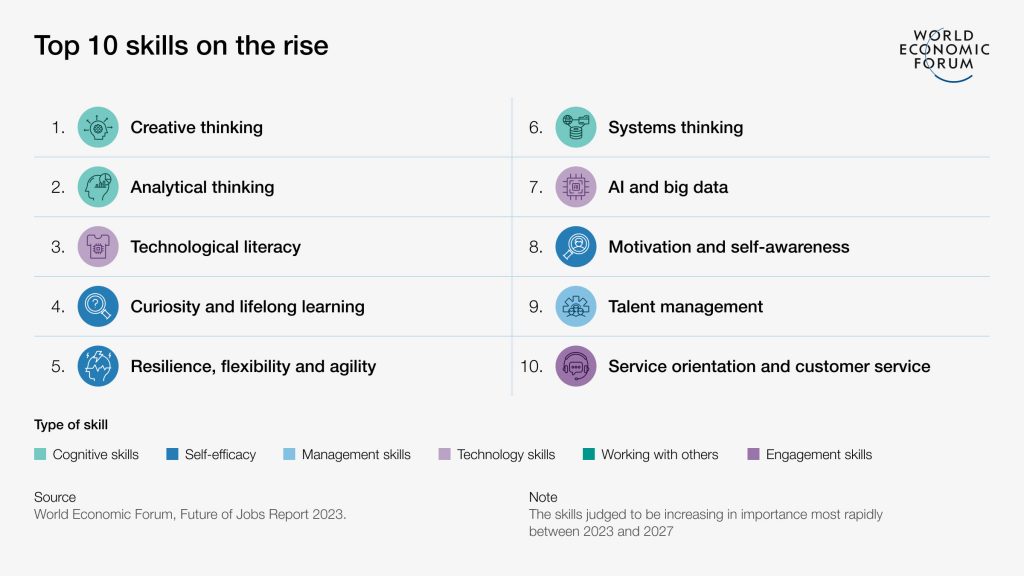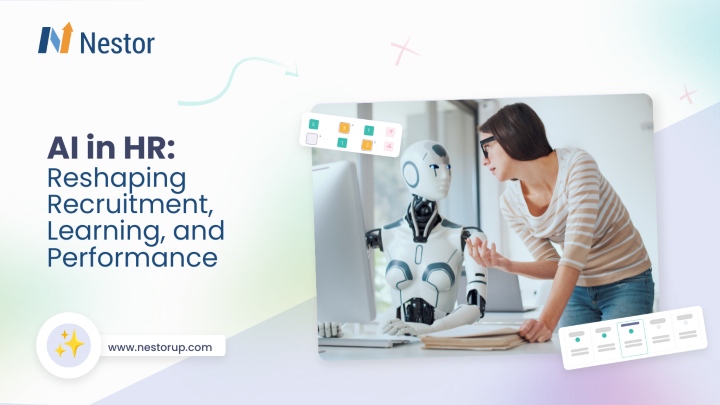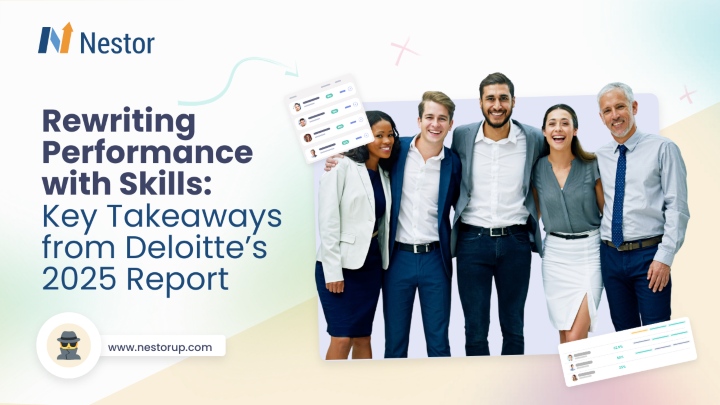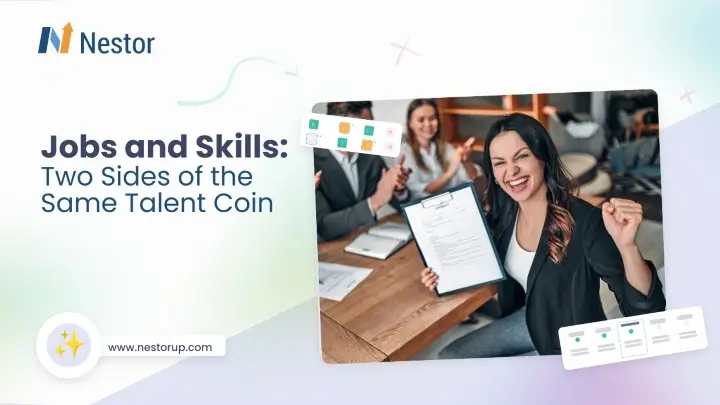
The skills that once guaranteed success in the world of work are evolving. And keeping up with unforeseen innovations and industry trends has never been more important or urgent. In this new world, both individuals and organizations will need to embrace the new pillars for success, or what we like to call the skills of the future.
It’s enough to look at eye-opening statistics like this one, from the Word Economic Forum — “We need to reskill more than 1 billion people by 2030.” — to understand the pressing need to identify and start developing these abilities.
In this article, we’ll look at what these skills of the future encompass and how organizations can already start the process of preparing their workforce for tomorrow’s challenges. Let’s dive right in!
Why are skills critical for the future of work?
The traditional way we define and understand work and job roles is changing, and this is perhaps the main reason why skills will become more important than ever in the near future.
Fixed job descriptions and limiting procedures are quickly becoming a thing of the past in a business world that has learned, especially during the pandemic, that flexibility in both thinking and action is necessary to navigate uncertainty.
And few things fuel flexibility and agility more than skills-based approaches. From hiring and onboarding to training and redeployment, skills can improve and radically transform most (if not all) processes related to talent management.
Another driving factor, which is all the rage nowadays, is, of course, automation and AI. While it’s still hard to predict the full impact of these revolutionary technologies, it’s already clear that they will make many routine or repetitive tasks obsolete.
As a result, organizations and employees will need to invest their L&D efforts in skills that either complement automation or in abilities that cannot (yet) be replaced by machine learning and advanced algorithms.
Soft skills of the future
It’s not a coincidence that we’re first talking about soft skills. They come with a deeply human quality, or touch, that isn’t replicable by machines, no matter how advanced.
While this could change over the next decades, the capabilities enabled by soft skills, like understanding complex social and emotional cues or using creativity to adapt to unpredictable situations are quickly becoming more relevant and desirable than hard skills in the workspace.
Soft or human skills are also highly transferable, which means they can be used across different positions and departments — an asset for organizations that embrace internal mobility and for workers interested in dynamic career paths.
They also have a longer lifespan when compared to technical or digital know-how, so the benefits of including them in your skills library will extend over a longer period of time. To borrow a term from a different area, we could argue that soft skills are evergreen. Their value does not diminish over time.
Some of the key human skills of the future that both employers and employees should focus on are:
- Leadership skills: Having effective leaders is a key priority for business success. They are the people who can make difficult strategic decisions and maintain a positive workplace culture, where everybody can thrive and reach their performance and development objectives. Leaders also act as examples, inspiring their peers and displaying the values and strength required to navigate difficult times. Therefore, investing in the leadership skills of the future is a business imperative whose importance cannot be overstated.
- Critical thinking and problem-solving: Being able to analyze situations and data from multiple points of view and come up with innovative ideas or solutions will be expected from all types of employees in the future, not just decision-makers. As simple tasks are delegated to digital solutions or machines, employees will need to solve more complex and less nuanced problems in order to provide value.
- Adaptability and resilience: Being adaptable is what enables people and organizations to turn challenges into opportunities. It’s the secret to success and what differentiates leaders from followers in the competitive business world. To acquire and develop these critical skills, organizations, and workplaces should embrace a growth mindset and adopt learning as a continuous process.
Learn more about the importance of soft skills in the modern workplace.
Technical skills of the future
While technical or hard skills aren’t going anywhere (at least, not all), they no longer enjoy the same status they used to have.
The pace of technological advancement is simply too fast. This not only shortens the life of technical skills but also renders them less transferable. How can you, employer or employee, leverage a skill that became obsolete two years ago?
It’s not all doom and gloom, though. Certain hard and digital skills, especially those related to AI, automation, and the data economy, will remain valuable and sought after, even in the new age of work.
While these will vary from one industry to another, here are some technical skills that represent a safe investment:
- Data literacy: As the (business) world becomes more data-driven, all employees, regardless of their role or industry, will need to develop at least basic abilities to collect data and extract insights that lead to better decisions and higher performance. As far as companies are concerned, having a workforce with high data literacy will enable them to make the most of data assets and identify trends or patterns that simply wouldn’t stand out otherwise.
- Cybersecurity: As digital assets become paramount, understanding how to ensure the privacy and security of critical data (e.g., passwords, financial information, business deals, patented technologies) will become the responsibility of everyone, not just IT professionals. This is especially important as cutting-edge technologies, like the IoT, augmented reality, or the blockchain are already transforming the workplace.
- AI & machine learning: Although the current capabilities of AI don’t yet match the hype around it, these technologies are part of the Fourth Industrial Revolution, which is expected to reshape all aspects of society, not just work. In this context, it is only natural to see businesses invest significant resources in attracting talent that can develop, test, and improve internal systems using Artificial Intelligence.

Source: Future of Jobs Report 2023 Image: World Economic Forum
How to start equipping your workforce with the skills of the future?
One of the lessons from the pandemic was that a lack of flexibility and unpreparedness in the face of disruption can be costly.
Following that period, many business leaders are now looking at proactive measures and approaches to make their organizations more agile and their workforce more resilient.
And you can further drive and support these efforts to future-proof employees through strategic actions like:
Keep up with the latest technologies and adopt them early
While the late-mover approach has its own advantages in the business world, it can also make your company less competitive and innovative. While challenging, embracing new technologies doesn’t need to happen organization-wide from the start.
You can begin by identifying the teams or departments most likely to be affected and start trials, during which some workers will test out new gadgets and (online) tools. Insights from their assessments will then be used to determine whether a specific solution is ready for prime time or not.
By using these tools early and experimenting with their impact on workflows and procedures, people will start developing the know-how needed to operate them early on and will be in a better position to train their colleagues when the rollout happens across the organization.
Invest in upskilling and reskilling programs
Both upskilling and reskilling are integral parts of the future of work and skill development. While upskilling is about expanding existing abilities or adding related ones (vertical moves), reskilling is more focused on unlearning and relearning capabilities and knowledge required for different job roles (lateral moves).
It’s difficult to say how each industry will be affected and which type of program will be in more demand. For example, large-scale retailers have already started retraining employees who are no longer needed for customer support or checkout.
But starting early and providing personalized development programs, which are based on skill gaps insights, people’s career aspirations and business priorities will prove to be a win-win strategy in the long run.
Provide flexible career paths for all employees
As jobs are evolving, so are the needs and expectations of workers. Staying in the same job or industry is no longer as attractive as it used to be. Stability is no longer paramount. Now, it’s all about growth, learning, and finding a sense of professional fulfillment.
HR experts, together with L&D specialists and people managers need to define strategic and clear career paths within the organizations that are more flexible. This process can be sped up and facilitated by skills-based approaches, through which job roles are broken down into specific abilities and expertise levels — allowing employees to see what skill set they need to acquire or develop to move either vertically or horizontally.
Embracing this approach will not only equip people with the skills of the future but will also make them more engaged and will extend their stay with your company. As long as growth and satisfaction are present, they will be less likely to look for opportunities somewhere else.
Create a culture of continuous learning
The saying “The more you know, the more you realize you don’t know.” isn’t limited to scientific research. It holds just as much truth and value in the workplace, especially nowadays.
The employee of tomorrow can no longer put limitations or end dates for their learning process. Growth needs to be continuous. And it should be encouraged and driven by strong company values.
Developing a culture of ongoing learning will take time. But the rewards are worth it. Your people will remain relevant and productive and the organization will increase its innovation and long-term sustainability.
To nurture a culture like that and acquire the skills of the future, organizations can start by:
- connecting personal development to organizational goals
- promoting, encouraging, and transforming learning into a habit
- making all L&D opportunities transparent and accessible
- providing a wide range of personalized learning experiences
- investing in the upskilling of managers and supervisors
- involving employees and listening to their feedback
Learn more about nurturing a culture of continuous learning.
Final thoughts
Adaptability, emotional intelligence, critical thinking, technical and digital prowess — organizations that invest in these vital skills of the future will not only succeed but also be at the forefront of innovation in the new AI- and data-driven world.
Starting this process early on will unlock exciting opportunities for employers and employees alike, and will equip both with the necessary abilities to successfully adapt to evolving workplace dynamics and technological revolutions.








